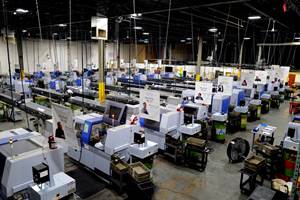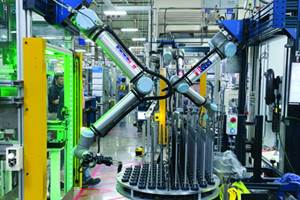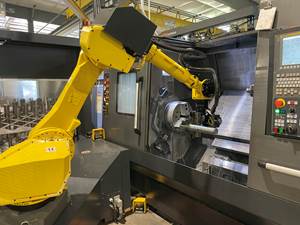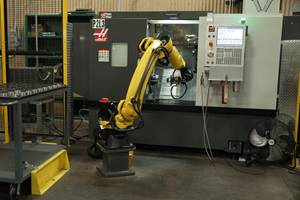Calming Fears About Automation
Shop owners say it’s too complicated, employees think it’s going to replace them. Here’s why they’re both right, and both wrong.
Share





.png;maxWidth=45)
DMG MORI - Cincinnati
Featured Content
View More
ECi Software Solutions, Inc.
Featured Content
View More


There is an unfounded phobia about automation that exists in the machining world. Automation is a naughty word in some machine shops. Shop owners think implementing forms of it, including robotics, is too complicated, and employees think it’s going to steal their jobs and send them to the unemployment line.
My opinion is that machine shop owners and employees are both very right, and very wrong. First, let’s address the reasons they are very wrong.
There’s a lot of misinformation out there about automation. I have been told even by some salespeople representing the technology that in order to use it in my shop I need high part volumes, and that the implementation of this equipment will be difficult. However, I have seen significant change in both of these areas. The automation that was available 20 years ago may have been complicated to implement, and therefore high volumes may have been required in order for a shop to justify it, but that is no longer the case. Successful implementation of automation now costs a fraction of what it once did. Additionally, proper fixturing will greatly reduce the volume of work required to make automation financially worthwhile for a shop.
Meanwhile, automation is not meant to replace human employees. That is not the reason I have ever employed it. Automation exists to make employees more productive. You wouldn’t want to dig a mile-long trench with a shovel, would you? That’s why the backhoe was invented. One piece of machinery can be far more productive than 10 people with shovels (more on this below). But even if this shoveling is done away with, the people are still needed for other parts of the job.
The same is true about automation in machine shops. It’s a tool that allows employees to get more done in less time. It can accomplish tasks faster and better with less effort. It makes complex work easier to do with fewer mistakes. The shop’s human employees then can focus on problems that require human solutions, such as overseeing the process, changing it where necessary and maintaining equipment.
Now let’s explore why both shop owners and employees are also very right in their automation concerns.
Yes, automation can be complicated and expensive, but only if you’ve hired the wrong company to implement it for you. As I said, implementation is not like it was 20 years ago, so don’t hire someone who says nothing has changed in this regard. Beyond just installing the equipment, there must also be some ongoing effort by both the supplier and the shop to ensure that the equipment is used most effectively. If you do not change your processes so that they are suited to automation, your automation efforts will fail.
Employees can also be right about automation taking away their jobs. It does take away jobs that require lower skill levels. Using my trench-digging example above: Automation requires fewer diggers and more equipment operators. Employees will need to increase their skills to learn to run the equipment. It’s important for the machine shops to realize this, too, and provide training opportunities for their workers.
In fact, as automation has spread, so have openings. There are many vacant jobs out there in manufacturing because there are not enough skilled people to fill them. Successful use of automation requires a skilled and educated workforce.
As a machine shop owner, I’ve seen automation from both sides of the fence. My early fear of implementing the technology was based on poor information from poor sources. Understanding automation’s benefits requires a mindset change. It’s like when you got your first computer: It was a bit complicated, but you learned how to use it, and now you can’t live without it. Acceptance of automation should be expected to play out the same way, by both owners and employees.
The industry needs to understand that automation is nothing to be scared of; it’s simply a tool in a shop’s arsenal that will allow it to compete at a global level.
Udo Jahn is general manager at Modern Engineering, a Vancouver-area contract machine shop that is one of the larger five-axis machining providers on Canada's west coast. More at moderneng.com.
Related Content
Inside the Premium Machine Shop Making Fasteners
AMPG can’t help but take risks — its management doesn’t know how to run machines. But these risks have enabled it to become a runaway success in its market.
Read More4 Steps to a Cobot Culture: How Thyssenkrupp Bilstein Has Answered Staffing Shortages With Economical Automation
Safe, economical automation using collaborative robots can transform a manufacturing facility and overcome staffing shortfalls, but it takes additional investment and a systemized approach to automation in order to realize this change.
Read MoreSame Headcount, Double the Sales: Successful Job Shop Automation
Doubling sales requires more than just robots. Pro Products’ staff works in tandem with robots, performing inspection and other value-added activities.
Read MoreWhich Approach to Automation Fits Your CNC Machine Tool?
Choosing the right automation to pair with a CNC machine tool cell means weighing various factors, as this fabrication business has learned well.
Read MoreRead Next
Registration Now Open for the Precision Machining Technology Show (PMTS) 2025
The precision machining industry’s premier event returns to Cleveland, OH, April 1-3.
Read MoreBuilding Out a Foundation for Student Machinists
Autodesk and Haas have teamed up to produce an introductory course for students that covers the basics of CAD, CAM and CNC while providing them with a portfolio part.
Read More5 Rules of Thumb for Buying CNC Machine Tools
Use these tips to carefully plan your machine tool purchases and to avoid regretting your decision later.
Read More




.png;maxWidth=150)






































